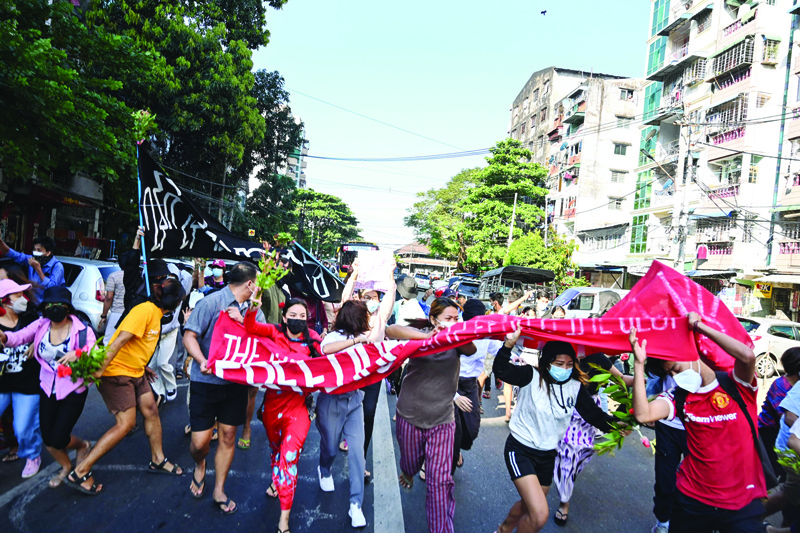KAYAH STATE: Young anti-coup recruits line up at a secret camp in Myanmar, hands behind their heads and stomachs braced, waiting for a drill instructor to deliver a punch to toughen them up for their fight against the military. Since the February coup, dozens of "people's defence forces" (PDFs) have sprung up across the Southeast Asian country to fight back against the generals' putsch and bloody crackdown. The college dropouts and villagers that fill their ranks have dealt some painful blows to junta troops with guerilla ambushes and mine attacks against the heavily-armed military.
But while analysts say they have surprised the army with their effectiveness, the new militias are short of serious weaponry and-lacking the income from the illegal drug and jade trade enjoyed by more established rebel groups-short of money to buy it. At the camp hidden in a clearing in thick jungle in eastern Myanmar's Kayah state, Htet Htet struggles with the training regime for recruits to the Karenni Nationalities Defence Force (KNDF), one of the new civilian militias.
"I can't do push-ups and my hands hurt," the 18-year-old told AFP in between crawling through the mud and walking on the stomachs of her comrades. "It's very tiring and I even cry sometimes." She was in limbo after her end-of-school exams were cancelled following the coup, but found new resolve after a cousin was killed fighting against the army, and is now training to be a combat medic.
Across Kayah state "only areas around permanent Burmese military bases" are not under the control of anti-junta fighters, a KNDF commander at the camp claimed in an interview with AFP. A few miles away, gun-toting fighters man a checkpoint wearing camouflage with gold, red and black KNDF insignia on their shoulders, their feet clad more casually in sneakers and flip-flops.
'Taken by surprise'
"The speed with which these local PDFs have mobilised, obtained weapons, and developed the tactics and capabilities to regularly ambush regime forces has been striking," International Crisis Group's Myanmar senior advisor Richard Horsey told AFP. The military has been "been taken by surprise, I think, and has struggled to put in place effective intelligence and tactical responses." State media say almost 400 roads and bridges have been hit by sabotage attacks since February, and local media have reported dozens of cell towers belonging to a military-owned telecoms firm being taken out of action.
But counting casualties is difficult. A shadow group of lawmakers claims almost 3,000 junta troops died in fighting with PDFs between June and November. The junta-which has declared all PDFs to be "terrorists"-says 75 soldiers and 93 members of the police were killed between February and late October. Both sides were likely "inflating and deflating casualty figures," said David Mathieson, an analyst formerly based in Myanmar.
Putting a figure on how many have signed up to fight the military is also hard to do with any certainty. The KNDF commander would not say how many combatants the group had, but fighters told AFP each battalion was between 300-400 strong, with at least a dozen across Kayah state. "We don't need to worry about manpower," he said. "We have a lot. We just need weapons."
Shelling out
But getting hold of them is not easy. KNDF territory is too far from the Thai border to go shopping in the country's black market for munitions. Gangs and militias that control territory in between are happy to smuggle-but the price is hefty for the KNDF, who mostly rely on donations from supporters to buy weapons and supplies.
In March-April one M-16 rifle cost four million kyat ($2,200) and an AK-47 five million kyat, an arms dealer who sells to the KNDF told AFP on condition of anonymity. Then the value of Myanmar's kyat currency plunged and now the weapons go for almost double the price, leaving the militias to improvise. "Most are using homemade guns," 18-year-old Byar Reh says of his battalion from a dripping tent in the camp that is his new home, and "only a few" of his comrades have automatic rifles. "If we had enough... we can kick the military out of our state entirely."
For now, with sentiment against the junta still running high, it's likely donations will keep coming, said Horsey of the Crisis Group. "My hunch is that they will continue to benefit from strong local support... as well as donations from the diaspora... some of these PDFs will be around for the long term, I think." It comes as ousted leader Aung San Suu Kyi is jailed for four years for incitement against the military and breaching COVID regulations. Meanwhile, Htet Htet and the rest of her batch keep marching on the clearing in the misty jungle, shifting dummy weapons made of bamboo from shoulder to shoulder.
She already has her eyes on a future when civilian rule is restored. "After we win the revolution, I will follow my dreams to become a teacher," she says. The commander is more pragmatic. "We've come a long way but we still have some weakness, like a lack of weapons and supplies." "This war won't be over in two or three days." - AFP



